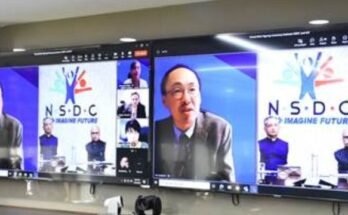Noida : Taking Skill Connect Road Show further, the seventh workshop was held in Noida on September 7. It was coordinated by National Skill Development Council (NSDC), Confederation of Indian Industries (CII) and Deutsche Gesellschaft für Internationale Zusammenarbeit (GIZ), after the event in Chennai received an overwhelming response from industry and sector skill councils, training partners and others, who participated in the dialogue on implementing the Apprenticeship Training in the industry.
The workshop was attended by Mr Rajesh Aggarwal, Joint Secretary, MSDE and Mr Per Borjegren, Team Leader, Indo-German Programme for Vocational Education and Training, GIZ India.
Mr Surajit Roy, Director, Apprenticeship, NSDC, explained the reforms under the Apprenticeship Act that have incorporated most of the demands of the industry to make the apprenticeship regime industry-friendly and shared the new operational framework for Apprenticeship in India. He emphasized that the new reforms will enhance self-regulation amongst the industries as the Apprenticeship Training under NAPS is a private sector-driven programme. By delegating the decision-making powers to the Sector Skill Councils and making them the Apprenticeship advisors, the new Act has been designed to reduce attrition and the friction between the industry and the apprentices, he explained. To showcase the user-friendly interface, NSDC conducted a live tour of the Apprenticeship Training Portal.
Mr Rajesh Agarwal, reflecting upon the less number of Apprentices in Indian industrial ecosystem despite the large population, appealed the participating members to hire more Apprentices to arrive at par with countries like China and Germany. Highlighting the issue of sensitisation of Apprenticeship in India, he encouraged actual learning on shop floor over classroom learning. To extract the best set of skills from the youth, the industries need to invest time and money, he explained.
Mr Agarwal hailed the Skill Connect Road Show as an excellent effort to identify the stakeholders’ preferences in skilling the youth. By authorising the Skill Sector Councils to regulate the Apprenticeship Programme, the key process of producing industry-ready workforce has been empowered. He added that the MSDE is working closely with Ministry of Human Resource and Development (MHRD) to produce skill gap case studies, which can lay the foundation of the policies regulating skill development in India. Efforts to start Bachelor of Vocational Courses are being made to enhance the skill levels of the youth. To reduce the attrition, the process of demand-supply matchmaking between Apprentices and the industry is also in the pipeline, he revealed.
Impressed by the movement and changes in Indian skill ecosystem, Per Borjegren identified the competence of Indian workforce and encouraged the idea of empowering the youth with skills and creativity. To enhance the confidence levels amongst Apprentices, he advocated the idea of a quality skill development mechanism, preferably industry-driven, matching the expectations of the key stakeholders.
GIZ further presented the Indo-German Programme for Vocational Education and Training and the experiences made by the project in creating a systemic change by enabling industry associations to become ‘professional skill development service provider’ for its member companies. The experiences from Bhiwadi and Aurangabad were shared in detail to create an understanding on how the industry or cluster associations can apply elements from the new Apprenticeship operational framework to steer the skill development services. The need for training of in-company trainers and counselling sessions to ITI trainees as well as youth
interested in skill training, was stressed by both GIZ and CII.
CII presented its 360-degree assistance in the Indian industrial ecosystem and offered to support the industries through handholding, providing a help desk and addressing both the demand and the supply side with respect to the Apprentices by systematic identification through Model Career Centre.
As a special case, Mr Sanjeev Kumar Jha, ESSILOR, introduced the EyeMitra training imparted to familiarise people with the 2.5 new vision generation of spectacles. By means of interactive session, the participants were invited to deliberate on the inputs provided by NSDC, CII and GIZ; and in the context, present the opportunities and areas of improvement for a speedy review; the support that should be extended by each of the organization as well as their participation in apprenticeship training (the job roles they expect would be required by their companies, and the corresponding number of apprentices).
Suggestions from participants to undertake more number of practical training programmes and soft skills courses in the curriculum were welcomed by the authorities. Several clusters where Apprenticeship Programmes can be offered were identified and discussed. Issues raised by the industry with respect to the Apprenticeship Programme were addressed, and their concerns noted.
The workshop ended on a positive note with expectations of enhanced engagement by all the stakeholders in promoting Apprenticeship Programme. Several companies identified job roles and stepped forward/raised their hands towards engaging apprentices in their organizations.



